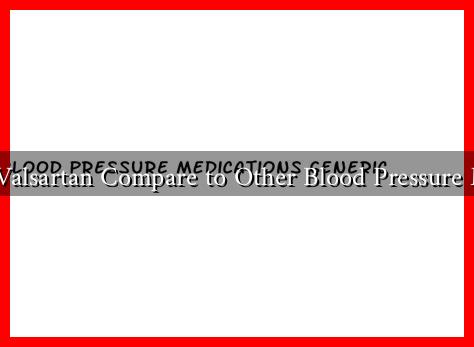-
Table of Contents
How Does Valsartan Compare to Other Blood Pressure Medications?
High blood pressure, or hypertension, is a prevalent condition affecting millions worldwide. Managing hypertension is crucial to prevent serious health complications such as heart disease and stroke. Among the various medications available, Valsartan, an angiotensin II receptor blocker (ARB), has gained attention for its effectiveness. This article explores how Valsartan compares to other blood pressure medications, including its mechanism of action, benefits, side effects, and overall effectiveness.
Understanding Valsartan and Its Mechanism of Action
Valsartan is primarily used to treat high blood pressure and heart failure. It works by blocking the action of angiotensin II, a hormone that causes blood vessels to constrict. By inhibiting this hormone, Valsartan promotes vasodilation, leading to lower blood pressure. This mechanism is similar to other ARBs, such as Losartan and Irbesartan, but Valsartan has unique properties that may make it more suitable for certain patients.
Comparative Effectiveness of Valsartan
When comparing Valsartan to other classes of antihypertensive medications, several factors come into play:
- ACE Inhibitors: Medications like Lisinopril and Enalapril are also commonly prescribed for hypertension. While both ACE inhibitors and ARBs lower blood pressure effectively, ARBs like Valsartan are often better tolerated, particularly in patients who experience cough as a side effect of ACE inhibitors.
- Calcium Channel Blockers: Drugs such as Amlodipine and Diltiazem work by relaxing the muscles of the heart and blood vessels. While effective, they may cause peripheral edema (swelling), a side effect less commonly associated with Valsartan.
- Diuretics: Thiazide diuretics like Hydrochlorothiazide are often used in combination with other antihypertensives. Valsartan can be combined with diuretics for enhanced blood pressure control, particularly in resistant hypertension cases.
Benefits of Valsartan
Valsartan offers several advantages over other blood pressure medications:
- Cardiovascular Protection: Studies have shown that Valsartan can reduce the risk of heart failure and improve outcomes in patients with left ventricular dysfunction.
- Renal Protection: Valsartan is beneficial for patients with diabetic nephropathy, as it helps protect kidney function.
- Once-Daily Dosing: Valsartan typically requires only once-daily dosing, improving patient adherence compared to medications that require multiple doses.
Side Effects and Considerations
While Valsartan is generally well-tolerated, it is essential to consider potential side effects:
- Dizziness and Fatigue: Some patients may experience dizziness, especially when starting treatment or increasing the dose.
- Hyperkalemia: Elevated potassium levels can occur, necessitating regular monitoring of blood tests.
- Pregnancy Category: Valsartan is contraindicated during pregnancy due to potential harm to the fetus.
Case Studies and Statistics
Research supports the efficacy of Valsartan in managing hypertension. A study published in the Journal of Hypertension found that Valsartan significantly reduced systolic and diastolic blood pressure compared to placebo. Additionally, a meta-analysis indicated that ARBs, including Valsartan, were associated with a lower risk of cardiovascular events compared to other antihypertensive classes.
Conclusion
In summary, Valsartan is a valuable option for managing high blood pressure, particularly for patients who may not tolerate ACE inhibitors or experience side effects from other classes of medications. Its unique mechanism of action, combined with its cardiovascular and renal protective benefits, makes it a compelling choice in the antihypertensive arsenal. However, as with any medication, individual patient factors must be considered when determining the most appropriate treatment plan. Always consult with a healthcare provider to find the best medication tailored to your specific needs.

